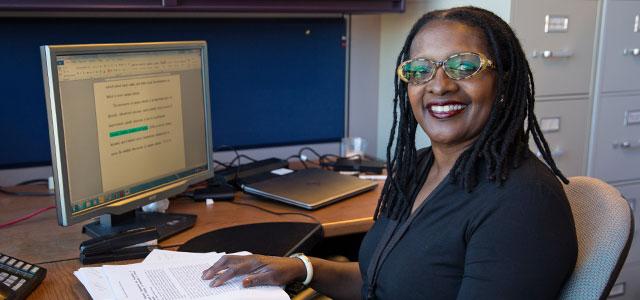
Linda Darlene Gregory Believes Diversity Is Transformative
Since she began her nursing education, Linda Darlene Gregory (MS ’03) has seen few people of color among the faculty and researchers with whom she has worked. A woman of color herself, Gregory made it a central part of her life’s work to understand why there were so few.
Now, after nearly 30 years as a nurse and nurse administrator, she has embarked on a research program aimed at identifying the barriers that prevent more minorities from pursuing careers in nursing science. “I wanted to be an active participant in change, and in moving towards creating a sustainable and diverse workforce and professoriate. To achieve that, we need a broader understanding of what are meaningful interventions,” she says.
A Perfect Fit with the BRIDGE Project
After receiving her master’s in nursing administration from the UC San Francisco School of Nursing, Gregory served as a program director for the Coalition for Nursing Careers in California, doing outreach to minorities to raise awareness of careers in nursing and allied health. In 2007, she joined the nursing staff of the UCSF Medical Center as an administrative nurse manager, which led to a job as workforce outreach and diversity coordinator at the medical center.
Then, in the fall of 2011, Gregory returned to UCSF to pursue her PhD; her timing couldn’t have been better. The University had recently launched the Biomedical Research Career Identification in Graduate Education (BRIDGE) Project, a new program designed to investigate ways to help underrepresented minorities succeed in achieving their career aspirations in the research sciences. Gregory was soon recruited for the project, helping to advance the project goals and enhancing her own education along the way.
Gregory’s research interests and her work experiences made her an excellent choice to help BRIDGE investigators design and test interventions aimed at improving the graduate school experience for underrepresented minority students. Her early work in the PhD program, a pilot study of underrepresented minorities in the School’s graduate nursing programs, came to the attention of Robyn Gershon, professor of epidemiology and biostatistics at the School of Medicine and the principal investigator for the BRIDGE Project. Gershon invited Gregory to participate. A supplemental grant to promote diversity in health-related research from the National Institute of General Medical Sciences allowed her to join the team as a predoctoral fellow.
Identifying Barriers and Opportunities
“I’m exploring the lived experiences and perspectives of underrepresented minorities [in graduate nursing programs],” she says. “What contributes to their academic success, their sense of belonging and their psychosocial well-being?”
As part of that work, Gregory contributed to the design of the questionnaire and recruitment for focus groups to validate BRIDGE interventions, such as workshops on financial management and identifying mentors, both of which are serious challenges for many minority students and affect their careers down the line. Debt obligations, for example, are a burden and can limit career choices and keep minority scientists from staying in academic research and teaching. It can be especially difficult for underrepresented minority students to find mentors who will understand their particular challenges and experiences.
“And the research indicates very strongly that mentoring and having diversity in the faculty is key,” says Gregory. “If you see individuals that look like you, it gives you the internal drive and says you can make it, too.”
Establishing Career Identity
A related issue that has arisen from Gregory’s research is the importance of establishing career identity and confidence in one’s skills as a research scientist, and knowing what it means to be a researcher in one’s field. It goes beyond simply learning how to do the work, says Gregory. “It’s about getting yourself oriented and acknowledging that you are a scientist. That affirmation is very helpful in terms of recognizing who you are and who you’re preparing yourself to be.” That happens, in part, with the help of accomplished researchers and mentors who can help emerging scientists stay motivated and offer personal perspectives on the particular challenges facing underrepresented minorities in the sciences.
As a student, Gregory is still in the process of establishing her own identity as a researcher, and she credits her mentors, including Gershon and the School of Nursing’s Catherine Waters and Audrey Lyndon, with inspiring her. Last year, Gregory’s identity as a scientist got a boost when the Alumni Association of UCSF named her to a list of 150 outstanding alumni for her work around diversity issues.
Becoming Part of the Solution
Gregory is anxious to continue on her career path, and hopes to eventually mentor and inspire other minority students – and to contribute to increasing the representation of minorities in the health care workforce.
It’s particularly important in a world that is growing smaller and a country that is growing more diverse, she says. “Diversity within any environment is transformative to everyone.… It just makes it much more congruent with what’s going on in the world.”



